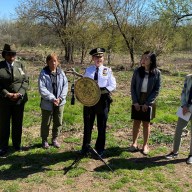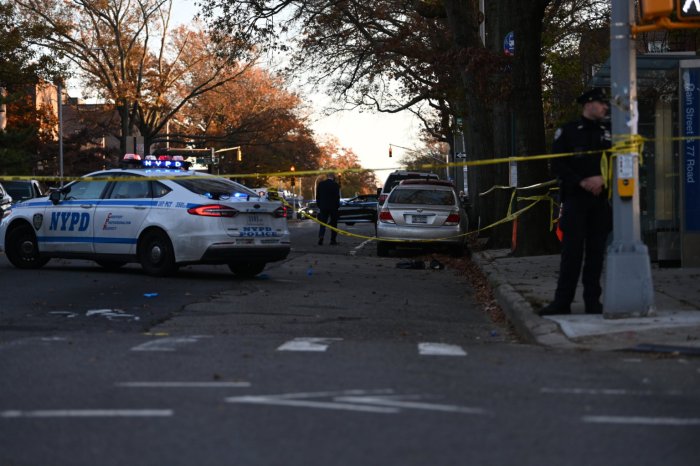By Alex Davidson
It is hard for Rev. Lemuel Rodriguez to walk from one part of his ministry's food pantry to the other without having one of the grateful beneficiaries pull him over by the arm and thank him for making life in the borough less harsh.
“This is a great man,” said Elda Villamil after she attended a service held by The Promise International Christian Ministry in Corona. “He does so much for everyone.”
Rodriguez, with help from the United Way, Food for Survival and the Federal Emergency Management Administration, runs the seven-year-old facility that provides meals to hundreds of the borough's hungry, most of them immigrants who cannot enroll in government entitlement programs because they are illegal residents.
“I use this space to serve the community,” said Rodriguez, who proudly gives tours of the food pantry at 96-04 Northern Blvd. as he points out the pantry, his office and the pulpit. “The majority of people here don't have their papers.”
Rodriguez is one of many religious leaders in Queens feeding the borough's immigrants, many of whom have retreated from government programs and are now seeking out religious institutions to avoid any potential problems over their residency status.
As more than 250 people line up outside his food pantry every Friday to get a bag of food containing tuna, peaches, tomato soup, and instant mashed potatoes, Rodriguez gives each person a handshake Most are from Colombia, Ecuador, China and India.
“Citywide immigrants are one of the fastest growing populations at soup kitchens and food pantries,” said Joel Berg, executive director at The New York City Coalition Against Hunger, along with working families.
But he pointed out that “many working families are immigrants.”
Queens' population rose from 1.9 million in 1990 to 2.2 million in 2000, fueled primarily by immigration, according to the latest census figures.
Berg said the coalition performed its annual citywide study on immigrants and found that they are more likely than the entire population to be employed. But he said the wages they receive are too low and they are more inclined to seek out help from private organizations to make ends meet to avoid discussion of their residency status.
“Queens used to be an affordable housing option to Manhattan, but in most neighborhoods now it no longer is,” he said. “And illegal immigrants have never been able to get food stamps at all in the program's history.”
The federal food stamps program provides coupons and cards to low-income families to buy food. The U.S. Department of Agriculture distributes the benefits through the state and local welfare offices. New York state provides food assistance for immigrants no longer eligible for federal food stamp benefits.
But despite the programs available to immigrants, many people familiar with immigration issues say the recent arrivals do not take advantage of public benefits.
Antonio Maloney, executive director of Immigration and Advocacy Services in Astoria, said because of heightened attention to immigrants after Sept. 11, they are less likely to voluntarily approach the government.
“Food banks don't really ask for someone's legal status,” he said. “But the government probably asks for something.”
Maloney said since the nation's welfare system was reformed under the Clinton administration in 1996, immigrants denied benefits have been even more wary of seeking out federal assistance.
Rodriguez said his ministry focuses more on feeding patrons than asking them about where they come from and how they got to Queens. He said the majority of his clients are immigrants who just want a meal.
“We ask no questions here,” Rodriguez said. “Some people just come in, sign in, eat and then leave.”
Luis, a 34-year-old illegal immigrant from Ecuador who is also homeless, comes every week to Rodriguez's Corona food pantry because he has no other means of getting food. Through an interpreter, he said he cooks his food in the street and was brought to America by his two brothers, who have since died.
Immigrants, both legal and illegal, have five minutes to eat their meals at a downstairs table at the Corona pantry because Rodriguez said he needs to accommodate everyone who waits in a line going around the block to get food. He said 12 to 16 volunteers give the people their food, time their meals and then must tell them to leave to make space for others.
As local food pantries scramble to serve immigrants, the city is gearing up to help new arrivals.
Carl Strange, spokesman for the city Human Resources Administration that oversees the distribution of food stamps, said centers have popped up in Battery Park and Brooklyn to accommodate the influx of immigrants. He said the facilities have interpreters in most languages who inform people about the benefits for which they can apply.
“What we're trying to do is make sure no one is turned away because of a language barrier,” said Strange, who did not know whether a similar site would open in Queens.
He also said the number of people previously not on public assistance who are now getting food stamps in the city rose by 24 percent in 2002. He could not specify how many immigrants were included in the increase.
But private food pantries appear to be reaching more of the immigrant population.
Pastor David Cockfield of God's Battalion Pentecostal Assembly in Far Rockaway said his food pantry concentrates on distributing food primarily to immigrants from the Caribbean, Russia and other parts of Europe.
“Most of the people coming here have their papers in order,” he said. “But if someone comes in without documentation and they show proof that they have children or they are in some sort of an emergency, they will be able to get food.”
For religious leaders like Rodriguez, who have to feed as many people as possible in less than four hours, the primary focus is on fighting hunger among the borough's newcomers.
“You first have to make sure people are eating right,” he said. “Then when they are healthy, you can begin to educate them,” Rodriguez said.
Reach reporter Alex Davidson by e-mail at TimesLedger@aol.com or by phone at 229-0300, Ext. 156.





























